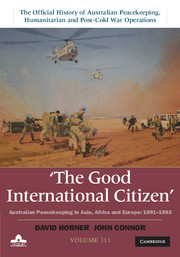Book contents
- Frontmatter
- Contents
- Maps
- Preface
- Chronology 1989–99
- Abbreviations
- Part 1 Strategy and policy
- Part 2 Cambodia
- 3 From Angkor Wat to Pol Pot
- 4 Law and order on the border
- 5 An Australian peace proposal
- 6 First into Phnom Penh
- 7 The roadblock
- 8 Change in plan
- 9 ‘Democracy's surprise triumph’
- 10 Developing Operation Banner
- 11 Winding up Operation Banner
- Part 3 Western Sahara
- Part 4 Former Yugoslavia
- Part 5 Watch on Iraq
- Appendix A United Nations Security Council resolutions
- Appendix B Major office bearers, 1991–99
- Bibliography
- Index
- Plate section
- References
3 - From Angkor Wat to Pol Pot
Cambodia to 1988
from Part 2 - Cambodia
Published online by Cambridge University Press: 12 May 2022
- Frontmatter
- Contents
- Maps
- Preface
- Chronology 1989–99
- Abbreviations
- Part 1 Strategy and policy
- Part 2 Cambodia
- 3 From Angkor Wat to Pol Pot
- 4 Law and order on the border
- 5 An Australian peace proposal
- 6 First into Phnom Penh
- 7 The roadblock
- 8 Change in plan
- 9 ‘Democracy's surprise triumph’
- 10 Developing Operation Banner
- 11 Winding up Operation Banner
- Part 3 Western Sahara
- Part 4 Former Yugoslavia
- Part 5 Watch on Iraq
- Appendix A United Nations Security Council resolutions
- Appendix B Major office bearers, 1991–99
- Bibliography
- Index
- Plate section
- References
Summary
In the pre-dawn gloom of 23 May 1993, men and women, dressed in their best clothes, began arriving at the Buddhist temple, or wat, in the town of Svay Rieng on the eastern edge of Cambodia. These people had come to the wat because it was one of more than 1200 polling booths established for an election run by the United Nations that would create a new Cambodian government after two decades of war. The polling booth at the Svay Rieng wat was overseen by Ben Reilly of the Australian Electoral Commission. Reilly was one of sixty-nine Australians who joined almost a thousand other men and women from forty countries who arrived in Cambodia just before the election to serve as International Polling Station Officers. Despite the Khmer Rouge's threat to attack polling booths and disrupt the election, the people of Svay Rieng town would not be deterred from exercising their right to vote. By the time the polls opened at 8.00am, about a thousand people, waiting patiently but eagerly, had gathered outside the wat. Upon entering, each woman and man presented their voter registration card, had their right index finger marked with ink to prevent multiple voting, and were issued their ballot paper. The last time Cambodia had held a free election had been in the early 1950s, so for almost everyone in the queue this was the first time they had ever been able to vote for the candidate of their choice.
Most, thanks to a UN voter education program, knew how to correctly fill out their ballot paper, but some were unsure what they should they should do with their completed vote. Reilly recalls individuals trying to shove ballots into chinks in the sides of the polling booths or folding the paper neatly and putting it securely in their pocket. One individual tried to push their ballot paper into a gap between the wat's floorboards. The Cambodian electoral staff were alert to this possibility. They asked each departing voter if they had put their paper in the ballot box. If they had not, they sent them back to retrieve their vote from the hiding place in which they had placed it. Almost two thousand people voted that day at the Svay Rieng wat. Not one vote went missing.
- Type
- Chapter
- Information
- The Good International CitizenAustralian Peacekeeping in Asia, Africa and Europe 1991–1993, pp. 41 - 65Publisher: Cambridge University PressPrint publication year: 2014



